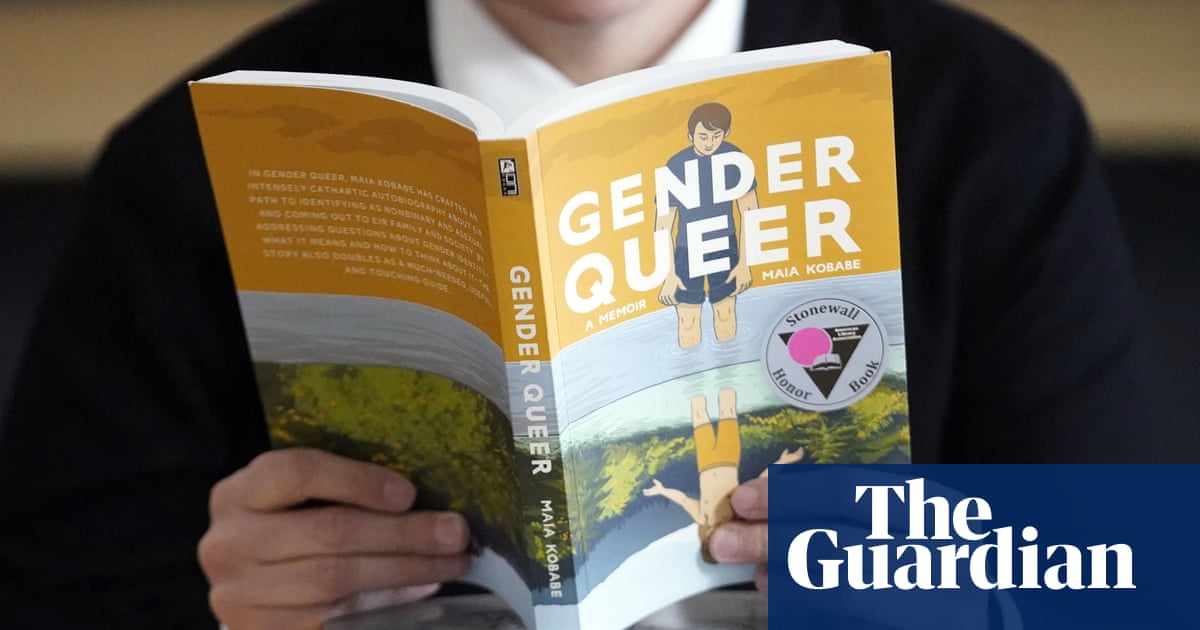Gender Queer, a graphic novel on gender identity, has been reapproved for sale in Australia following a conservative campaign against the book forcing the Classification Review Board to reconsider its initial decision.
The federal courtlast year ordered the boardto reassess its decision to give the Maia Kobabe memoir an unrestricted M classification, after rightwing activist Bernard Gaynor challenged the ruling.
Gender Queer has been the target of conservativecampaigns to have it banned in the US.
Complaints about the book – which details Kobabe’s experience coming out as non-binary – are focused on the cartoon images of sex scenes, one of which has been described by critics seeking a ban as “pornographic” and “paedophilic”.
The federal court found that the classification board, in its first review, had given a “broadbrush dismissal” to views in submissions that sought to have the book banned as anti-LGBTQ. Many of those views objected to what they saw as depicting a man having sex with a minor – referring to an image portraying Plato’s Symposium.
Sign up for the Afternoon Update: Election 2025 email newsletter
In a decision of a newly convened board of three members who were not involved in the original decision, published on 19 April, the book was approved for distribution in Australia on the same classification as the earlier ruling.
The board found descriptions and depictions of sexual activity are an integral part of the story on the author’s struggle to understanding gender identity and sexuality, and the sex is highly stylised and containing little or no realistic detail, as well as infrequent.
“The impact of the nudity is no higher than moderate and can be accommodated at the unrestricted level,” the board said.
The board said the Plato’s Symposium image is “highly stylised”, does not depict sexual activity in a detailed or realistic manner, and it is not possible to determine the age of the two male figures in the image.
“The most that can accurately be said is that the panel contains a depiction of an older-looking male and a younger-looking male.”
On balance, the board said it did not accept that the image depicts, or appears to depict, an adult and a minor.
“The impact of the image is further reduced by the fact it mimics an ancient Greek vase.”
In addition to a submission from Gaynor where he described the scenes depicted in the book as breaching “the standards of morality, decency and propriety generally accepted by reasonable adults”, there were 526 public submissions received, including 82 identical submissions made from a Citizen Go online petition.
Sign up toAfternoon Update: Election 2025
Our Australian afternoon update breaks down the key election campaign stories of the day, telling you what’s happening and why it matters
after newsletter promotion
The board said the “significant majority” of submissions called for the book to be banned. The board noted some submissions used concerns that Gaynor had sent out in an email to his supporters, with 50 appearing to have been cut and paste directly from Gaynor’s email.
The board said while it acknowledged the submissions reflect the views of members of the public, it “cannot however be assumed that this cohort is representative of the broader community’s views”.
The Australian Library and Information Association provided a submission in favour of allowing the book in Australia.
“Books such as Gender Queer which have a first-person narrative from a non-binary person play a particularly important role in reducing prejudice and increasing understanding,” the peak library organisation said in its submission. “It is important to also acknowledge the support the novel Gender Queer can give to people who are nonbinary, transgender and/or asexual.
“Theirs is a story that is not often told which can delay self-awareness and coming out to friends and family.”
The board found while some material in the book may bring discomfort for some readers, Gender Queer’s classification “reflects the publication’s literary, artistic, and educational value”.
In Australia, the crisis support serviceLifelineis 13 11 14. In the UK and Ireland,Samaritanscan be contacted on freephone 116 123, or emailjo@samaritans.orgorjo@samaritans.ie. In the US, you can call or text theNational Suicide Prevention Lifelineon 988, chat on988lifeline.org, ortext HOMEto 741741 to connect with a crisis counselor. Other international helplines can be found atbefrienders.org
